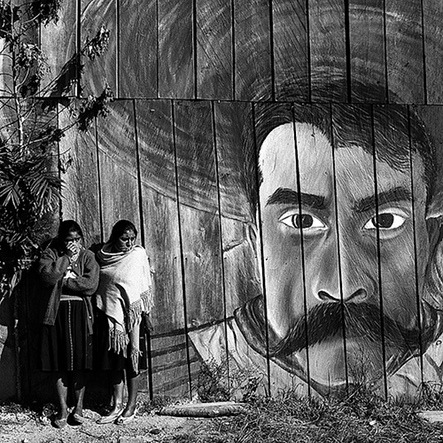Nobel Prize winner Jose Saramago died
last Friday. In addition to being a non-repentant communist, he was a dedicated
supporter of the indigenous Mayan communities in rebellion in Chiapas, Mexico.
He travelled to Mexico and Chiapas on several occasions and met with the
insurgent women and men there. Once, while in Mexico City he gave a speech in
which he said, "when I come to Mexico I am not a communist, I am a
Zapatista." In the mid-1990s I had the privilege to meet with Saramago in
New York City with Juana Ponce de Leon, Dan Simon and others to discuss his
work and invite him to write the foreword to a book Juana and I were working on
together for Seven Stories Press — Our Word is Our Weapon: The Selected
Writings of Subcomandante Marcos.
Saramago agreed to write the essay, which is posted below.
During our
meeting with Saramago in New York, the issue of the "real" identity
of Subcomandante Marcos came up. At first, Saramago thought we should cite
Subcomandante Marcos's "real name." Juana and I took issue, and countered
that the name Saramago proposed we use for Marcos was the name that the Mexican
government had used in their propaganda campaign to neutralize the Zapatistas.
The rebel communities call him Subcomandante Marcos, and is the name he uses to
sign his writings. The great maestro paused a moment, touched his glasses and
in response told us the following story….
"During a high point in the
Mexican government's campaign against the Zapatistas, the Zedillo
administration circulated a press release claiming to reveal the real identity
of Subcomandate Marcos was Rafael Sebastian Guillen Vicente. As part of the
campaign, then Mexican President Ernesto Zedillo said 'I'll meet with Rafael
Gullien any time , anywhere.' A few days later Subcomandante Marcos responded
to Zedillo's taunt by saying, 'Excellent. Then the three of us can all meet
together.'"
— Greg Ruggiero,
Editor, City Lights Books Open Media Series
* * *
The following is excerpted from Zapatista by Jose Saramago, translated from the Portuguese by Gregory Rabassa, Foreword to Our Word is Our Weapon: Selected Writings of
Subcomandante Insurgente Marcos, edited by Juana Ponce De Leon. Published by Seven Stories Press.
In 1721, with a feigned innocence
that couldn't conceal his tart sarcasm, Charles-Louis de Secondat asked: "Persians? But how is it possible for someone to
be Persian?" It's been almost
three hundred years now since the Baron de Montesquieu wrote his famous Lettres
Persanes and even today we haven't succeeded in putting together an intelligent
answer to this most essential of all questions found on the historical agenda
of human relationships. As a
matter of fact, we still can't understand how it was ever possible for someone
to have been a "Persian," and furthermore, as if such a peculiarity
were not out of the question, to persist in being one today when the picture
the world lays before us seeks to convince us that the only desirable and
profitable thing to be is what in very broad and artificially conciliatory
terms is customarily called "Western" (Western in mentality,
fashions, tastes, habits, interests, manias, ideas…), or, in the all too
frequent case of not suc ceeding in reaching such sublime heights, to be
"Westernized" in some bastard way at least, whether the results were
attained through force of persuasion or in a more radical way, if there was no
other solution through persuasion by force.
To be "Persian" is to be someone strange, someone different,
in simple terms to be the "other." The very existence of the
"Persian" has been enough to disturb, confuse, disrupt, and perturb
the workings of institutions; the "Persian" can even reach the
inadmissible extreme of upsetting what all governments in the world are most
jealous of: the sovereign
tranquility of their power.
The indigenous were and still are "Persians" in Brazil (where
the landless now represent another type of "Persians"). The indigenous in the United States
once were but have almost ceased to be "Persians." In their time
Incas, Mayas, and Aztecs were "Persians" and their descendants were
and still are "Persians," wherever they have lived and still live.
There are "Persians" in
Guatemala, Bolivia, Colombia, and Peru.
There is also an overabundance of "Persians" in that painful
land of Mexico, where Sebastiao Salgado's inquiring, rigorous camera drew
shudders from us with the challenging figures facing us. They ask: How can it be that you
"Westerners" and "Westernized" people to the north, south,
east, and west, so cultured, so civilized, so perfect, lack that modicum of
intelligence and sensibility necessary to understand us, the
"Persians" of Chiapas?
It is really only a matter of understanding, understanding the
expression in those looks, the solemnity of those faces, the simple way of
their grouping together, feeling and thinking together, weeping the same tears
in common, smiling the same smile, understanding the hands of the sole survivor
of a slaughter that are held like protective wings over the heads of her
daughter, understanding this
endless stream of living and dead, this lost blood, this acquired hope, this
silence of someone who has borne centuries of demanding respect and justice,
this suppressed anger of someone who has finally wearied of hoping.
Six years ago, changes were
introduced in the Mexican Constitution in obedience to the neo-liberal
"economic revolution" directed from without, and were mercilessly
applied by the government to bring agrarian reform and redistribution to an
end. This reduced to nothing the possibility for landless peasants to have a
parcel of land to cultivate. The indigenous thought they could defend their
historic rights (or simply their common-law ones, in case it was assumed that
indigenous communities had no place in the history of Mexico… ), by
organizing into civic societies which were characterized, and still are, in the
singular matter of renouncing any kind of violence, starting with the one that
was their due.
These
societies had the support of the Catholic Church from the beginning, but that
protection was of little use to them.
Their leaders and representatives kept being jailed, the systematic,
implacable, and brutal persecution by the powers of the State and the large
landowners increased in conjunction with and under the shadow of the interests
and privileges of both. They
continued the violent acts of expulsion from the indigenous' ancestral lands,
and the mountains and jungle, many times over, became the last refuge of the
people displaced. There in the
dense mists of the heights and the valleys the seeds of rebellion would
germinate.
The indigenous of Chiapas aren't the only humiliated and offended people
in this world. In all places and
at all times, regardless of race,
color, customs, culture, religious belief, the human creature we are so proud
to be has always known how to humiliate and offend those whom, with sad irony,
he continues to call his fellows.
We have invented things that don't exist in nature: cruelty, torture,
and disdain. By a perverse use of
race, we've come to divide humanity into irreducible categories: rich and poor, master and slave,
powerful and weak, wise and ignorant. And incessantly in each of these
divisions we've made subdivisions so as to vary and freely multiply reasons for
disdain, humiliation, and offense.
In recent years Chiapas has been the place where
the most disdained, most humiliated, and most offended people of Mexico were
able to recover intact a dignity and an honor that had never been completely
lost, a place where the heavy tombstone of an oppression that has gone on for
centuries has been shattered to allow the passage of a procession of new and
different living people ahead of an endless procession of murders. These men, women, and children of the
present are only demanding respect for their rights, not just as human beings
and as part of this humanity, but also as the indigenous who want to continue
being indigenous. They've risen up
most especially with a moral strength that only honor and dignity themselves
are capable of bringing to birth and nursing in the spirit even while the body
suffers from hunger and the usual miseries.
On the other side of the heights of Chiapas lie
not only the government of Mexico but the whole world. No matter how much of an attempt has
been made to reduce the question of Chiapas to merely a local conflict, whose
solution should be found within the strict confines of an application of
national law-hypocritically malleable and adjustable, as has been seen once
again, according to the strategies and tactics of economic and political power
to which they are surrogate-what is being played out in the Chiapas mountains
and the Lacondona Jungle reaches beyond the borders of Mexico to the heart of
that portion of humanity that has not renounced and never will renounce dreams
and hopes, the simple imperative of equal justice for all.
As that figure, exceptional and
exemplary for many reasons, whom we know by the name of the Subcomandante
Insurgente Marcos has written, "a world where there is room for many
worlds, a world that can be one and diverse," a world, I might add myself,
that for all people and all time declares untouchable the right of everyone to
be a "Persian" any time he or she wants to and without obeying
anything but one's own roots…
The mountainous highlands of Chiapas are without a doubt one of the most
amazing landscapes my eyes have ever seen, but they are also a place where
violence and protected crime hold forth.
Thousands of indigenous, driven from their homes and
their lands for the "unpardonable crime" of being silent or open
sympathizers with the Zapatista Front of National Liberation, are crammed into
camps of improvised huts, where there is a lack of food, where the little water
available is almost always contaminated, where illnesses like tuberculosis,
cholera, measles, tetanus, pneumonia, typhus, and malaria are decimating adults
and children. All this is hppening in full view of the indifferent authorities
and official medicine.
Some sixty thousand soldiers-no more nor less than a third of the
permanent strength of the Mexican army at present-occupy the State of Chiapas
under the pretext of defending and assuring public order.
The factual reality, however,
gives the lie to this justification. The Mexican army is protecting one part of
the indigenous population; it is not only protecting it but at the same time is
teaching, training, and arming these indigenous who are generally dependent
upon and subordinate to the Institutional Revolutionary Party (PRI), which for
sixty years has been exercising uninterrupted and practically absolute power.
These indigenous are-not by any extraordinary coincidence-the ones who make up
the various paramilitary groups organized with the sole objective of
undertaking the dirtiest work of suppression: the attack, rape, and murder of
their own brothers and sisters.
Acteal was one more episode in the terrible tragedy that begun in 1492
with invasion and conquest. All
through the five hundred years the indigenous of Ibero-America (and I use this
term intentionally so as not to let escape judgment of the Portuguese and later
on the Brazilians, who continued the genocidal process that reduced the three
or four million Indians existent in Brazil during the period of discovery to
little more than 200,000 in 1980) were passed, in a manner of speaking, from
hand to hand. They were handed from the soldier who killed them to the master
who exploited them, while in between there was the hand of the Catholic Church,
which made them exchange one set of gods for another, but which in the end was
unsuccessful in changing their spirit.
After the butchery of Acteal there began to be
heard over the radio words that said "We're winning." Some unaware
person might have thought that it was a matter of an insolent and provocative
proclamation by murderers. He
would have been mistaken. Those
words were a message of hope, words of courage which like an embrace over the
airwaves united the indigenous communities. While they wept for their dead-another forty-five added to a
list five-centuries old-the communities stoically lifted their heads and said
to each other "We're winning," because it really could only have been
a victory, and a great one, the greatest of all, being capable of surviving
humiliation, offense, disdain, cruelty, and torture in that way. This was a
victory of the spirit.
Eduardo Galeano, the great Uruguayan writer, tells how Marcos went to Chiapas and spoke to the
indigenous, but they didn't understand him. "Then he penetrated the mist, learned to listen, and
was able to speak." That same mist which prevents one person from seeing
is also the window that opens onto the world of the other, the world of the
indigenous, the world of the "Persian"… Let us look in silence, let us learn to listen, perhaps
later we'll finally be able to understand.
* * *
A video interview with Jose Saramago, shot by Michael Eisenmenger, may be seen here.
Mr. Saramago was known almost as much for his unfaltering Communism as
for his fiction. In later years he used his stature as a Nobel laureate to
deliver lectures at international congresses around the world, accompanied by
his wife, the Spanish journalist Pilar del Río. He described globalization as
the new totalitarianism and lamented contemporary democracy's failure to stem
the increasing powers of multinational corporations. To many Americans, Mr. Saramago's name is associated
with a statement he made while touring the West Bank in 2002, when he compared
Israel's treatment of Palestinians to the Holocaust. As a professional novelist, Mr. Saramago was a late
bloomer. A first novel, published when he was 23, was followed by 30 years of
silence. He became a full-time writer only in his late 50s, after working
variously as a garage mechanic, a welfare agency bureaucrat, a printing
production manager, a proofreader, a translator and a newspaper columnist. In 1975, a countercoup overthrew
Portugal's Communist-led revolution of the previous year, and Mr. Saramago was
fired as deputy editor of the Lisbon newspaper Diário de Noticias. Overnight,
along with other prominent leftists, he became virtually unemployable. "Being fired was the best luck of
my life," he said in an interview in The New York Times Magazine in 2007. "It
made me stop and reflect. It was the birth of my life as a writer." — Excerpt
from the New York Times obituary.
Image by mexadrian, courtesy of Creative Commons license.











